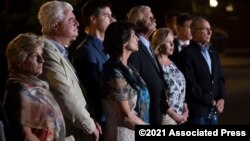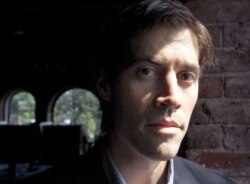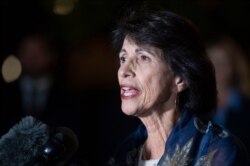The families of two freelance journalists killed by the Islamic State group in 2014 say the trial of one of the militants responsible has brought some justice for their sons.
At a court appearance Thursday in the U.S. city of Alexandria, Virginia, Alexanda Kotey admitted to his role in the kidnapping and deaths of four Americans in Syria — journalists Steven Sotloff and James Foley and aid workers Peter Kassig and Kayla Mueller — along with European and Japanese nationals.
Kotey pleaded guilty to eight counts, including hostage-taking resulting in death and supporting the terrorist Islamic State group.
Kotey is one of four militants who became known by their hostages as “the Beatles” because of their British accents. The U.K. revoked Kotey’s citizenship after his capture in 2018.
Thursday’s hearing coincided with the seventh anniversary of Islamic State militants' release of a video showing Sotloff’s killing.
“Steven finally has gotten some justice – not much, but it’s a start,” the journalist’s father, Arthur Sotloff, told VOA on Friday.
Sotloff, who attended the hearing, added that he still has no closure over the killing of his son.
Steven Sotloff worked for outlets including Time and Foreign Policy magazines. The journalist was kidnapped in 2013 and held with a group of other hostages, including Foley.
A third journalist who was held captive with them, British photojournalist John Cantlie, was forced to appear in Islamic State propaganda videos. His fate is unknown.
The families of the Americans killed by the Islamic State group campaigned to bring the perpetrators to the U.S. to stand trial after Kotey and another militant accused of involvement in the case, El Shafee Elsheikh, were captured trying to cross into Turkey.
Elsheikh’s trial is due to start in January. One member of their four-person group was killed in a drone strike in 2015. The fourth is imprisoned in Turkey.
In a statement yesterday, Diane Foley welcomed the latest development in the case. Her son James was a photojournalist who contributed to the Global Post and other outlets before being taken captive in 2012.
“We are sincerely grateful to all involved in apprehending Alexanda Kotey, investigating his brutal crimes against humanity, and making the strong case for his direct culpability for the torture and death of our son James, Steven Sotloff, Kayla Mueller, Peter Kassig, and countless other innocents,” she said in a statement.
Kotey's sentencing hearing is in March. He faces a mandatory life sentence.
The trial is significant because most perpetrators who target journalists are not held accountable, said Clothilde Redfern, director of the Rory Peck Trust, a London organization that supports freelance journalists.
“Global impunity for crimes against journalists is still shockingly high, with 90% of cases remaining unresolved,” Redfern told VOA. “Each conviction shows that journalism and journalists matter. If we’re to deter more similar crimes, which erode the fabric of our democracy, we need more convictions.”
Anna Nelson, executive director of media watchdog Reporters Without Borders (RSF) shared a similar view, telling VOA, "Criminal justice for crimes against journalists is incredibly rare."
"Tragically, we see impunity in the majority of cases in which journalists are killed. This is a primary reason we continue to push for measures to actively protect members of the media around the globe," Nelson said, adding that RSF continues to advocate for the release of journalists still held in Syria, including American Austin Tice, and Cantlie.
In her statement, Diane Foley urged the U.S. government to more seriously address threats facing journalists abroad, as well as the U.S. hostage crisis.
The James W. Foley Legacy Foundation lists 55 publicly known cases of American nationals or residents currently held hostage or wrongfully detained.
“I would like to use this moment to beseech our government to prioritize the return of all U.S. nationals kidnapped or wrongfully detained abroad. Attacks on journalists are at an all-time high and our U.S. hostage crisis is a silent epidemic, which few are aware of,” she said.
“Jim challenges us as a country to have the moral courage to prioritize the return of all Americans held hostage abroad and to promote the safety of journalists worldwide.”
International media rights groups including the Committee to Protect Journalists (CPJ) also welcomed Thursday’s hearing.
Kotey’s plea “in no way lessens the pain he inflicted, but it will bring their [the victims’] families closer to the justice that they have been seeking and they deserve,” CPJ’s Sherif Mansour said in a statement.







